As a child, Zach Nicholson built elaborate structures with paper and tape.
“I think I tried to attempt a cathedral, but I don’t remember which one it was,” said Nicholson, 31 “It was impossible, essentially. Two, three feet tall. Which seemed to be incredible. I was probably seven or eight years old.”
When he turned 11, paper and tape gave way to flour, milk, sugar and eggs. Nicholson looked for the “most incredible” cake in his mother’s Good Housekeeping cookbook. “I would always try to make this Black Forest cherry thing. It’s a chocolate cake with multiple layers and with cream, cherries and stuff. My sisters helped me a little bit. We would curve the cake layers and make sure it was all aligned perfectly. That probably set the foundation for future technical skills.”
As chef/owner of Lucky Cat Ramen restaurant, Nicholson still is assembling. His creations may not be tall, but they’re complex and flavorful. He often uses several ingredients, but all the dishes use ramen noodles as the base.
Nicholson and his wife, Sarah, who began making and selling ramen dishes last December at Lucky Cat Ramen pop-up restaurants around town, will move into their first – but temporary – brick and mortar restaurant Friday June 2nd at 247 Cooper. Dinner will be served four nights a week until November when the restaurant moves to its permanent location in the Crosstown Complex.
“The lights are repurposed from my wedding,” said Nicholson as he sat on one of the metal IKEA stools in the restaurant on the corner of Cooper and Peabody. ”I wish you could come back here in about four hours when it’s dark because the lighting in here is so spectacular.”
Nicholson and his wife were the interior designers of the restaurant, which includes furnishings made from materials bought at The Home Depot. “We wanted a minimal Japanese inviting feel to it, but also we want it to feel casual. We want it to feel back yardy.”
For now, the menu will not be extensive, Nicholson said. “Unfortunately, our kitchen here is very small and very limited equipment wise in what we can do. It will not be anywhere close to the menu available at Crosstown.”
But, he said, “It will be double the size of our pop ups. We normally had three bowls at a pop up – two pork or two meat and one vegetable bowl. We’ll probably do five or six ramen bowls.”
The pop up restaurants, which were featured on Sundays for several months at The Cove, weren’t easy to operate, Nicholson said. “Every time we’d go out it was loading up equipment, unloading. You’re talking about a full day. Two cars full. It was just physically demanding. Plus, the limitations of our menu.”
A native of Biloxi, Mississippi, Nicholson was intrigued by the physical demands of the chefs on TV’s “Iron Chef America” cooking show.. “I thought it was pretty incredible. I really thrive under high pressure situations.”
He loved “this kind of tension and make-or-break atmosphere, where, literally, these guys have an hour to make something happen and there was no surrender. It was just ‘You can’t give up. Can’t quit. You’ve’ got to get it done.’ That kind of energy, I think, is what sparked my curiosity toward cooking.”
A culinary career wasn’t Nicholson’s first choice. “I was going to the University of Memphis (majoring in) political science. And at the same time I was enrolled in Army ROTC. I was training to be a military officer in the Army. I conceived a child in the middle of all that. And then it became apparent that I should not pursue the military path if I was bringing a young person into the world. I should be around. That set in motion the sort of frantic look for a new direction.
“Through that soul searching is where i realized that maybe I needed to find something that was more satisfying to my soul. Something I really enjoyed. Not just doing something because it felt like it was the right thing to do. Which was what I was doing with the Army.”
Cooking, he said, “was what I appreciated most when I was a kid and loved doing.”
He made a list of the best chefs in Memphis. Erling Jensen, chef/owner of Erling Jensen: The Restaurant, was No. 1 on his list. “I walked in his back door and I asked to see him. And there he was. He invited me out to his dining room to talk to him and I explained, ‘I’ve never really been in the kitchen before in my life. I want to be a chef. And I hear you’re the best.’ As cliche as it sounds I said, ‘I’ll wash your dishes for free if you let me in your kitchen.’ He said, ‘OK. Come in tomorrow.’”
Nicholson’s first job at the restaurant was making salads. “ Not for free. He was paying me. He put me on the garde manger station immediately. Just threw me in there. Here I am sitting in front of the salad station on a busy night and he’s got this guy teaching me how to peel an asparagus. He’s like, ‘You don’t know how to do this? You don’t know how to hold a peeler right?’”
Nicholson stuck with it. “They don’t have time to baby people. It’s like you’re either going to figure it out or someone else will want your spot.”
After a few months, Nicholson got in the swing of working in a kitchen. Jensen was pleased, he said. “I think he liked my attitude. Just the desire to learn.”
Nicholson worked for Jensen on and off for the next nine years. “I’d go off, work for someone else, come back a little more knowledgeable, a little more experienced. He encourages that. He knows if you go and work for someone else you’re going to gain more experience. You’re going to touch different ingredients and different techniques and come back stronger.”
One of Nicholson’s stops was Austin. “I hopped on a bus with literally $50 in my pocket and a backpack full of clothes. I just got on a bus to Austin with no plan. Within two days I had a job working at one of the best restaurants in Austin.”
He met Sarah at a restaurant in Syracuse. ”She was the executive pastry chef and I was hired as a sous chef.”
They moved to Austin because they got tired of the depressing, cold Syracuse winters. “It was there that I took a second job working at a ramen restaurant.”
The couple fell in love with ramen the first time they tried it. It was affordable and satisfying. “Ramen was originally brought over by the Chinese to Japan. And the Japanese adopted it as their national dish. Ramen noodles are springy and chewy because of their high alkalinity. They’re unlike any other noodle.”
The ramen flavors they tried were “more the traditional flavors. Sort of the core basic flavors you’ll find in any ramen shop.”
“I’m a vegetarian,” Sarah said. “And I find it kind of difficult to find complex vegetarian options that have bright flavors, deep flavors, good textures. The whole savory sweet esthetic. Everything about ramen was extremely balanced. It’s very umami. It’s a complete meal in one bowl.”
Nicholson proposed to Sarah beneath the waterfall in the Japanese garden at the Zilker Botanical Garden in Austin. They decided to make Memphis their home. “Memphis right now is a hot bed for so many things that are new and perceived as experimental,” Nicholson said.
They were married in the backyard at his parents’ home. “We did our own food. We roasted a whole pig. We made our cake.”
Last August, the Nicholsons, who now have two sons, decided to open a ramen restaurant. They chose the name “Lucky Cat Ramen.” “In Japanese culture, you see the ‘lucky cat’ a lot of times. The little statues in shop windows. That’s supposed to be a good luck charm.”
Nicholson didn’t want their restaurant to be the typical ramen restaurant. ““Basically, what I wanted to do was take whatever we had already learned and bring that level of ramen, which was absent here, to the city. We were taking techniques and then sort of building on those with other techniques we’ve learned cooking in other restaurants. Taking sort of the best of everything that we experienced and find a way to make it affordable food.”
Said Jensen: “He’s a good guy. He’s come a long way. He’s an excellent chef. He’s married to a strong little girl. They know exactly where they’re going.”
When Lucky Cat opens its doors open to the public Friday, diners will discover ramen dishes that could be a mixture of Japanese, French, Thai or other influences. “There are so many rules and we don’t want to be bound by any of them,” Nicholson said. “We just try to pick the best of what we’ve learned and just make the best food possible. Once you’re really set free from the rules, then you can really get creative and do what you want.”
‘Mazeman,’ a dish they’ve made in the past, is a “dry ramen dish. It’s a brothless ramen. It’s basically a ramen with sauce that coats it. It’s almost like a normal pasta dish in a way.”
Many of their ramen ideas “come from just sort of reminiscing about our most profound food experiences,” Nicholson said. “We think about, ‘What were the best things we’ve ever eaten? And can we replicate those textures and flavors through the lens of ramen?’”


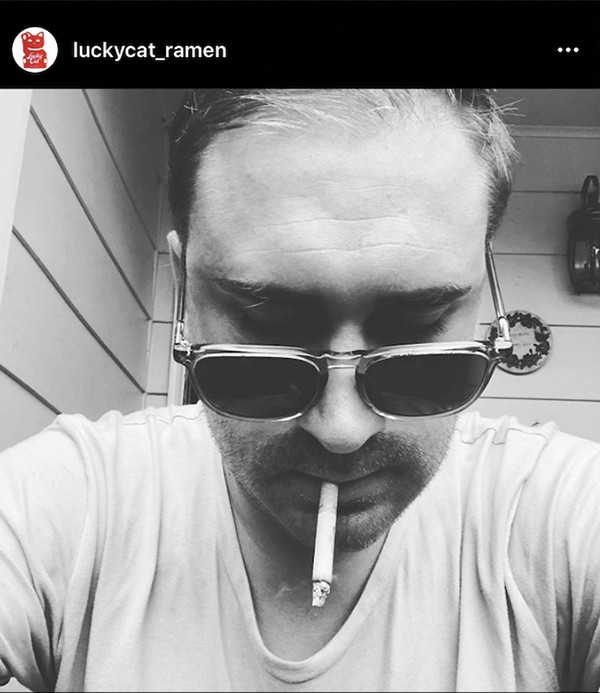
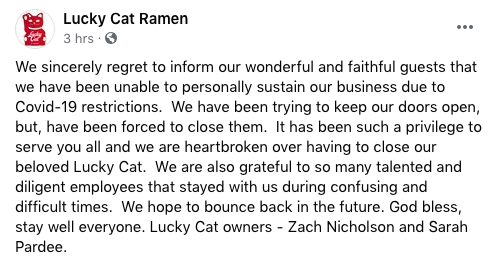

 Paul Gilliam
Paul Gilliam 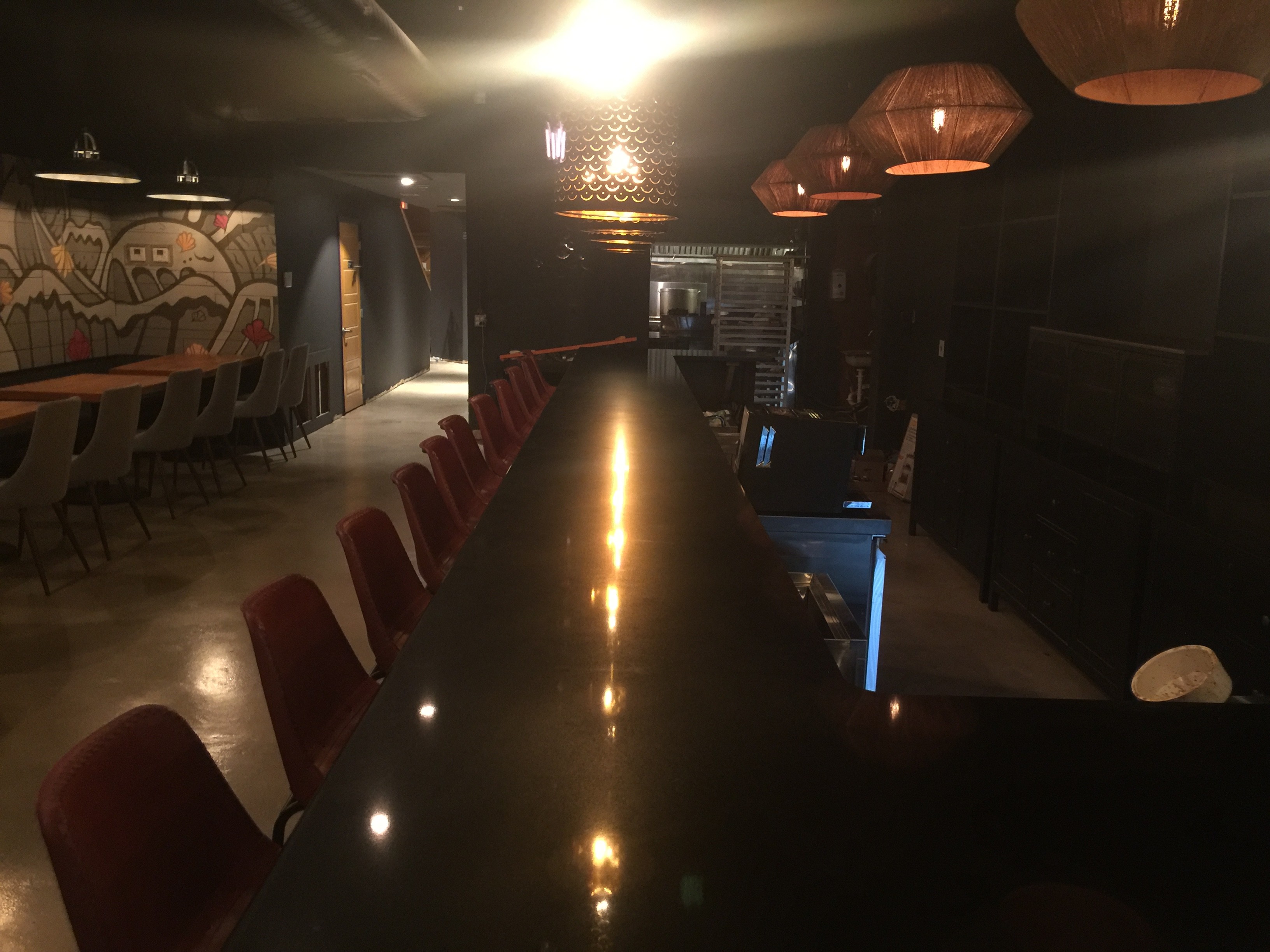 Michael Donahue
Michael Donahue 

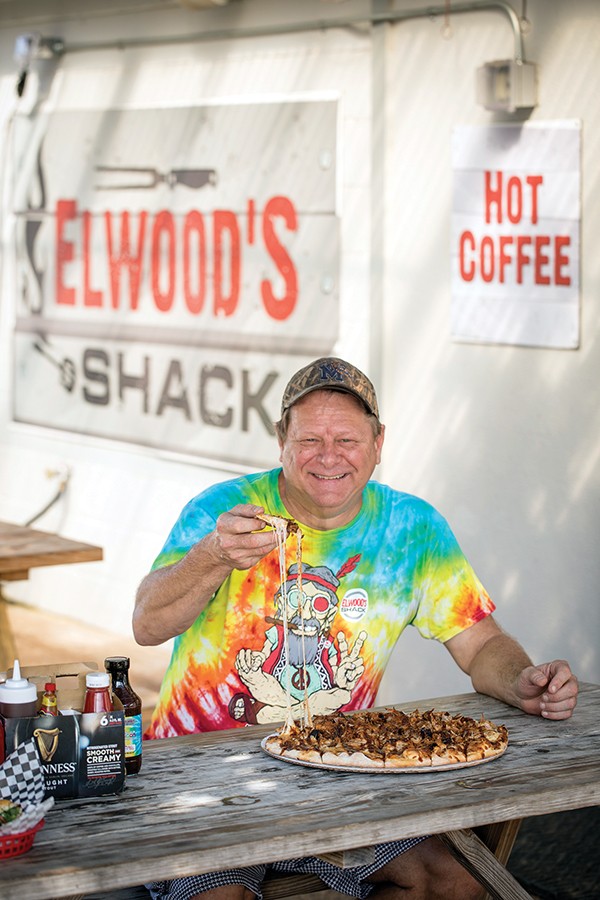
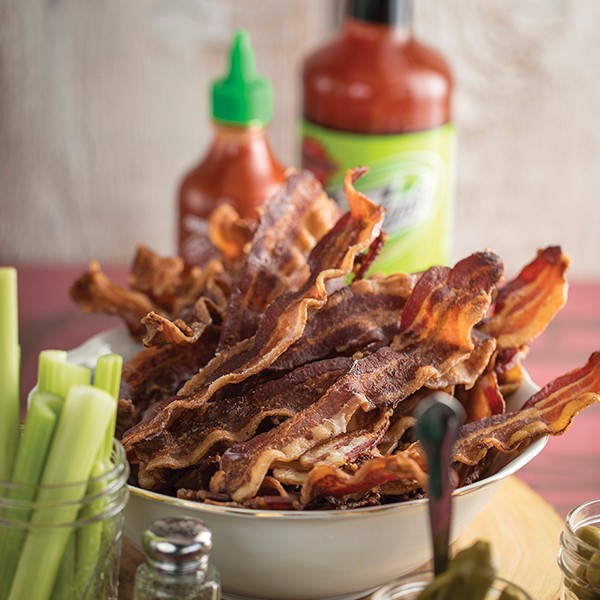
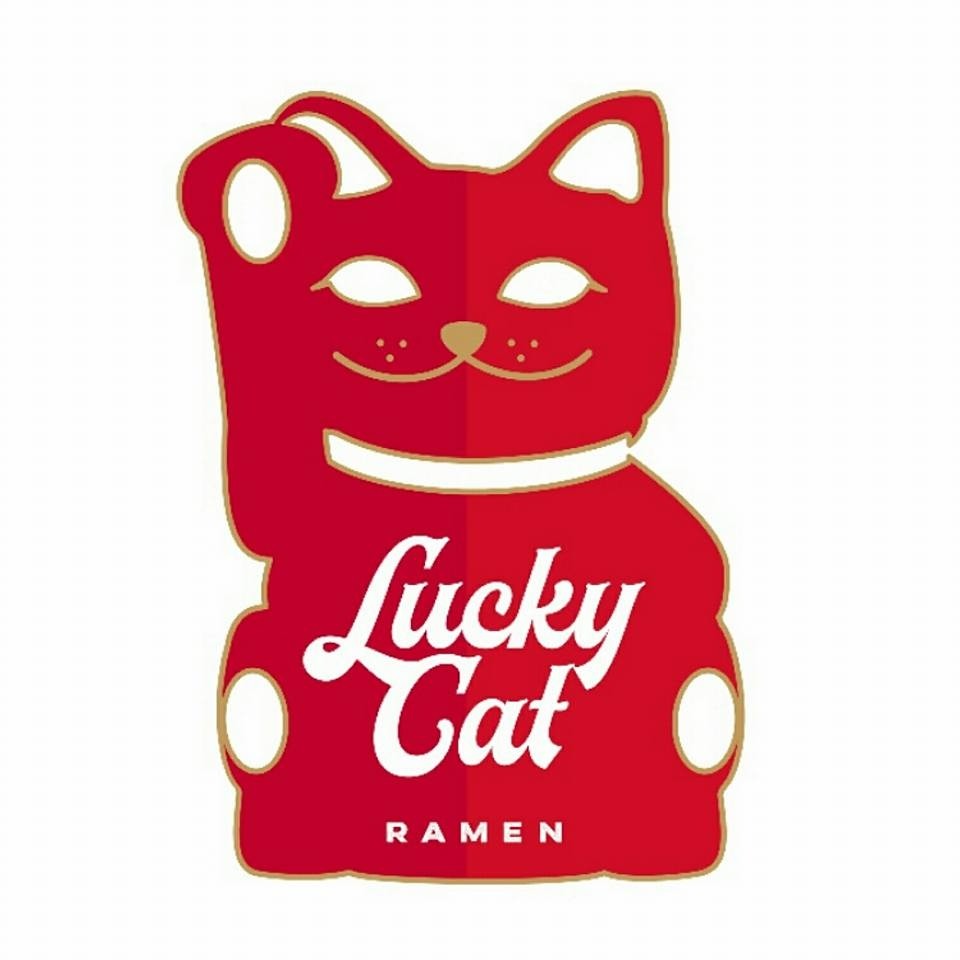 Lucky Cat, Facebook
Lucky Cat, Facebook 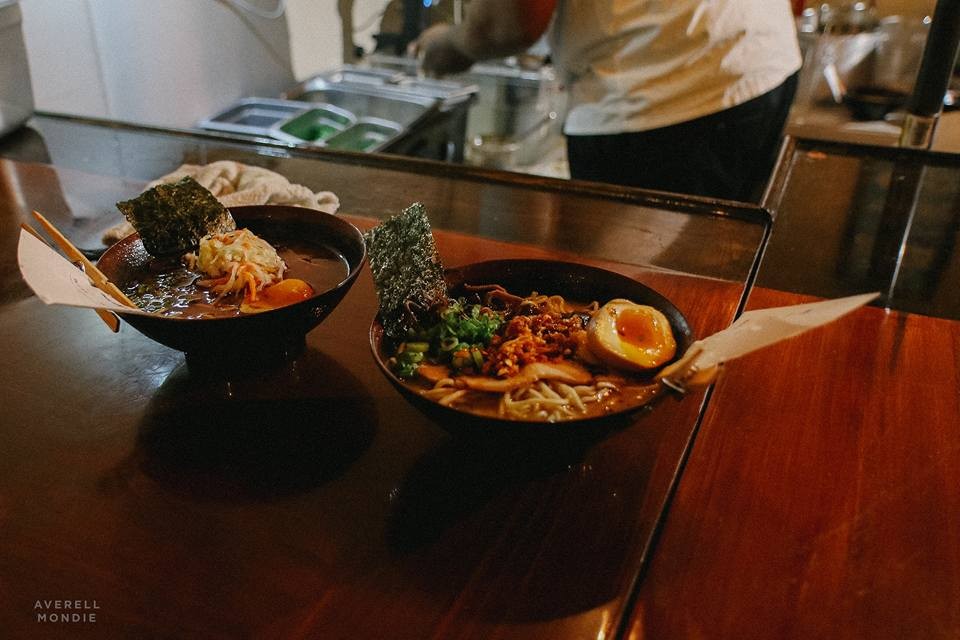 Lucky Cat, Facebook
Lucky Cat, Facebook 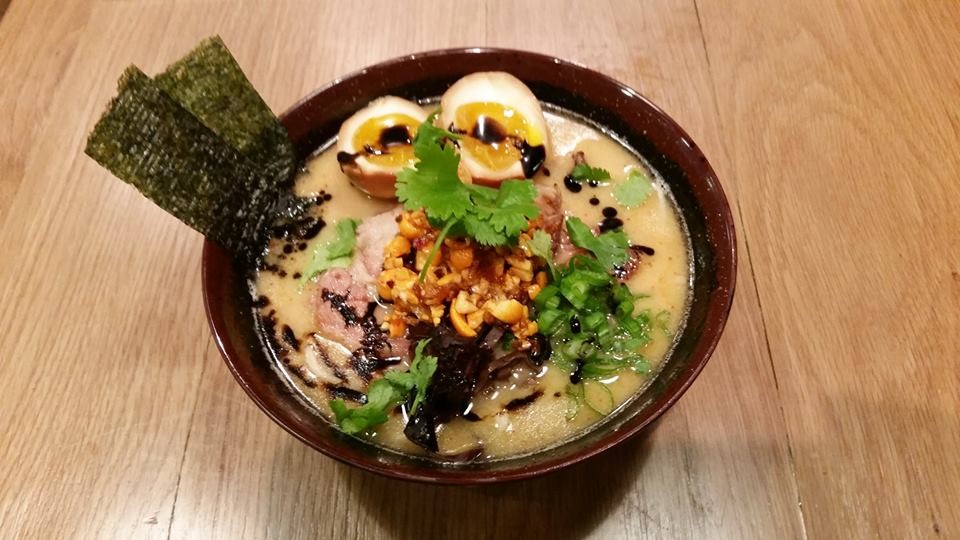 Lucky Cat, Facebook
Lucky Cat, Facebook